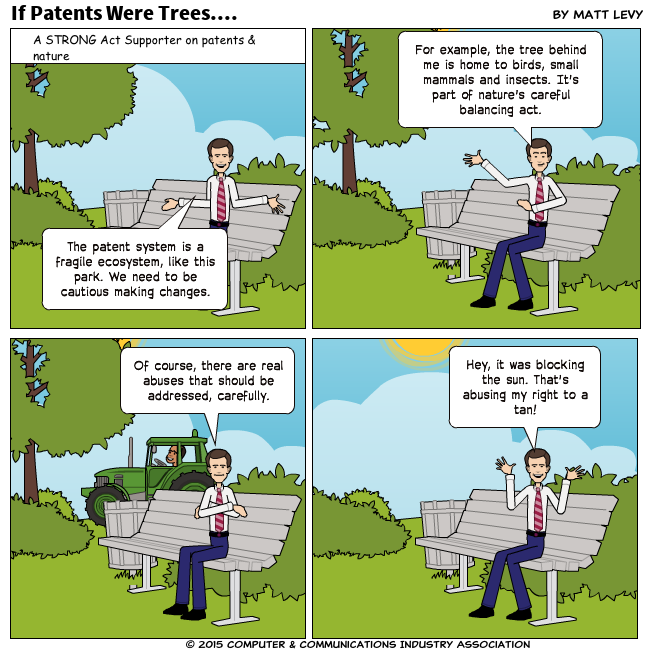Note: This is Part 3 in a three-part series. If you’re not comfortable with how inter partes reviewAn adversarial procedure created by the AIA for challenging patents. Intended to be similar to a court proceeding, the parties argue before an Administrative Patent Judge, not a patent examiner. The challenger must show a reasonable likelihood of successfully invalidating one claim before the PTAB will agree to grant a petition for review. works, you may want to start with Part 1. If you are comfortable with IPRs, start with Part 2.
Gutting Inter Partes ReviewAn adversarial procedure created by the AIA for challenging patents. Intended to be similar to a court proceeding, the parties argue before an Administrative Patent Judge, not a patent examiner. The challenger must show a reasonable likelihood of successfully invalidating one claim before the PTAB will agree to grant a petition for review.
Pharmaceutical and biotech companies are pushing for major changes to inter partes reviews (IPRs).
First, they want the same strong presumption of validity that patents get in district court. The presumption has been around for over a century and a half. The rationale is that a court should defer to the work of the USPTOUnited States Patent and Trademark Office. See also PTO.:
It is evident that a patent, thus issued after an inquisition or examination, made by skilful and sworn public officers, appointed for the purpose of protecting the public against false claims or useless inventions, is entitled to much more respect, as evidence of noveltyA requirement for patentability, based on 35 U.S.C. § 102(a) of the Patent Act. An invention cannot have been disclosed, offered for sale, or used publicly more than a year before seeking a patent. and utilityAn invention must useful to be patentable. Very few inventions are invalidated as lacking utility. Perpetual motion machines, for example, are typically found invalid for lacking utility., than those formerly issued without any such investigation. Consequently such a patent may be, and generally is, received as primâ facie evidence of the truth of the facts asserted in it.
Corning v. Burden, 56 U.S. 252, 271 (1854).
There’s no reason for Administrative Patent Judges (APJs) to defer to patent examiners, which is what pharma and biotech are asking for. APJs review patent examiner decisions during patent prosecutionPatent prosecution is the process of applying for a patent, along with any further proceedings before the USPTO.; they’re the ones we normally trust to do that job. I have yet to hear a real argument for why that should be different for IPRs.
The next major proposed change is to change the standard for claim constructionSee Markman hearing from the broadest reasonable interpretation of the claims to the understanding of one of ordinary skill in the art. At the same time, patent owners would have the right to substitute new claims; the petitioner would have to prove a substitute claim is invalid in order to block the amendment. This would give patent owners a huge advantage over district court, where they can’t amend their claims.
Pharma and biotech also want to stop companies who haven’t been sued from filing an IPRIntellectual Property Rights. Usually associated with formal legal rights such as patent, trademark, and copyright. Intellectual property is a broader term that encompasses knowledge, information, and data considered proprietary whether or not it is formally protected.. This would apply to Kyle Bass, but it would also apply to the Electronic Frontier Foundation, which recently used an IPR to stop the podcasting troll. It would block any company, public interest group, or individual from helping others by challenging bad patents.
The net result is to turn IPRs into, as Woody Allen put it in Bananas, “a travesty of a mockery of a sham of a mockery of a travesty of two mockeries of a sham.”
Maybe we should listen to the words of Senator Coons:
https://youtube.com/watch?v=1l09iiSc9j0%3Frel%3D0
Thank you, Mr. Johnson, I share that concern that we both meet the very real concerns and threats facing completely innocent end-user small businesses without causing needless harm to what is a very vital and I think somewhat fragile ecosystem that is unique and vital to our economy.
Oops! Senator Coons is the leading force behind the STRONG Act. That’s the bill that contains the proposals to gut IPRs.
It seems the patent ecosystem must have gotten a lot stronger in the last year.
Seriously, these changes to IPRIntellectual Property Rights. Usually associated with formal legal rights such as patent, trademark, and copyright. Intellectual property is a broader term that encompasses knowledge, information, and data considered proprietary whether or not it is formally protected. are completely counterproductive. They’re unnecessary and would take away what has become a useful tool in fighting patent trolls.
Let your senator know that you oppose the STRONG Act or any part of it becoming law, using the action button on the right.

